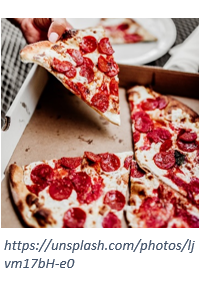Joanne Fitzpatrick, Research Data Manager, Lancaster University
Twitter: https://twitter.com/joannefitz
Lancaster University Library’s Open Research team has long had a reputation for excellence in building community and engagement. With several impactful initiatives, such as the pioneering Data Conversations, which are vibrant two-hour events where current Research Data Management issues are discussed over free pizza, which is always an essential part of any data conversation, as well as our Research Bites course and support for the PROSPR group.
The focus for our open research work, particularly our research data services, has been on positioning ourselves as the ‘friendly face’ of this new complex world: a light touch, bite size way of beginning to understand the concepts and frameworks that encompass open research, and building our infrastructures to provide a ‘low bar’ to their usage.
Crucially, this has provided the safe space that researchers have wanted to discuss these exciting and transformative new ideas, and to ask questions in a low risk environment, that they may have not felt able to in other settings. We have provided many opportunities to meet others, build professional relationships and partnerships, and have organised events where informal conversation happens about conceptual, high level issues.
During the past 7 years of our institutional research data services, the most detail we ever provided was in examples and case studies of the application of data sharing and publication practices, with a particular highlight on the benefits of sharing data to the research process. This was the right place to pitch our interventions, at the level of awareness raising and ‘selling’ the benefits, in order to encourage ‘buy in’ from our research communities.
Of course, as all work did back then, this all happened in person, within our library spaces and as such was always routed in face to face, live conversation. Then the pandemic happened, causing a major disruption to research, and with it our existing trajectory of supporting grass roots communities who were starting to think about open research in the theoretical sense in the first instance. We all know that online and asynchronous attempts at replicating this type of activity is a very different beast, as anyone who has used tools such as GatherTown will tell you, it is never quite the same.
It was under these conditions that Lancaster University Library’s extension was opened, containing spaces dedicated to activities described above, such as our Open Research and Digital Scholarship labs. Our spaces are flexible and contain technology to support a range of hybrid events, which have been hugely successful, in particular the Library Festival, the livestream of which attracted over 67,000 views on YouTube.
In this post lockdown environment, it was evident that we could never just put our existing, pre-pandemic communities straight in there, because everything has changed. For a start, the pandemic is still happening and some individuals remain too vulnerable to visit our spaces in person, but there are other, less obvious changes to our research communities that I will articulate below. You can see from our library festival success that as librarians we have the skills to reach people through online and hybrid methods – so what does this look like for our open research team going forwards?
We of course remain connectors, as stated in our Library Towards 2025 vision, and so far this has involved a range of in person and hybrid events, including Research Software Engineering training, Library Carpentries sessions, and Digital Humanities workshops.
These have been our more successful events, but there have been others, with varying degrees of attendance and engagement. As everybody else is, we are still learning as we go in what should really is unchartered territory as we navigate this post-lockdown landscape, and it’s through this ‘trial and error’ approach that we have adopted that I have gained the following insights.
My viewpoint is that what researchers want from our library research services now is very different, and has moved away from the ‘friendly face’ approach I described above, and into something else. I find that the focus on activity that advances careers has intensified – it was important before, but it’s even more important now, as researchers try to catch up with time lost in lockdowns and as the cost of living crisis sets in.
As a result, rather than high level introductions to open research concepts and suggestions of where to go to find out more, researchers want the definitive answer to the complex situations they are navigating. This can be tough to negotiate for a data librarian, as disciplinary differences can be extreme in this area, and I have often found this follows the structure of: provide a targeted example, the researcher adapts this for their project, and then requests that I check it and provide a definitive ‘yes’ or ‘no’ answer as to it’s suitability.
This querying consistently happens ‘at the point of need’, which in the world of data management planning, is usually when there is a grant application deadline. The role of funders is an important point here too, as increasingly requirements cover datasets as a research output, seen in the recent update to the UKRI policy that mandates the presence of Data Access Statements.
One last observation I have made in how our activity supports researcher careers, is the upskilling that we offer, and our most successful events in recent months have had this at their core. Researchers want practical skills to accompany the actionable advice they ask for, and the best sessions contain new learning that is put into place immediately – something that asynchronous content can really help us achieve.
The time for eating free pizza, making new friends and conversing about exciting and brave new open research concepts seems lost to the pre-pandemic world. Now we are ready to move forward, into the messy details and the hard work of how we can achieve big things and get ahead with these brave ideas, and thankfully, eating pizza is still something I engage in regularly.


